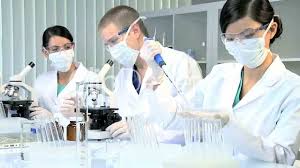The problem surfaces everywhere: how to organise successful R&D in a cooperation between research institutes and businesses. Two worlds with very different cultures. Each with their proper rules and their proper criteria for success. Freedom to publish in the world of research versus secrecy until a patent has been awarded in the business world. Whereas each partner needs the other for successful R&D: corporations can innovate only through scientific research; universities need the business community for development and marketing of their findings.
 Trust is decisive
Trust is decisive
The word that sums up all critical success factors is trust. For in cooperation in successful R&D, partners should trust each other. Trust needs to be built up. The ways to do so are very dependent on national cultures. Elements of trust are mutual respect, a shared vision of the future, innovative work, openness and short communication lines.
Mutual respect
An industry that looks for cooperation will have to understand that the goals of a university (enlarge the body of knowledge) are different from those of the company (earn money). Industry tends to secrecy, but academic researchers need many contacts with co-researchers, and freedom to publish. The solution is that the university is completely free to publish its research findings, but needs to wait for the company to file a patent application. In practice, this model works fine with a delay of about 6 months. It is important that the partners do whatever they are good at, and that they are free to perform their research according to their own views. For instance, a company should never ask a university to solve a production problem in the factory. That is for themselves to solve.
 Shared vision
Shared vision
All stakeholders should feel that the research is important for the future; with respect to the economy, the environment and/or society. They should agree on goals, and each party should somehow benefit from the research.
Innovative work
The cooperative project should be innovative in nature. The innovation might be in the desired result, the body of knowledge to be discovered or the way in which the research is done. Routine should be avoided.
Openness
Openness is one of the most difficult aspects in the cooperation of companies, universities and governments. Secrecy to outsiders is acceptable, of course. The cooperation contract will stipulate this. But sharing knowledge within the contract – it would seem to be a matter of course, but it almost never is. Usually, industry would prefer to communicate absolutely nothing to university researchers. ‘You could best stick to finding answers to our questions, we will not tell you how it works in our practice, and we will tell you when the work is finished.’ But of course, such a one-way street is untenable. In a productive cooperation, all partners are completely aware of each other’s practices, mistakes, results and second thoughts. This means that corporate secrets and revolutionary new ideas that one would prefer to keep in-house, will come to the table. In order to be successful in the cooperation between company and university, it is very wise for both partners to work at the same subject. Preferably in equivalent teams. If the company just demands and the university just has to supply, there will be friction in the system. For then the company will not have an insight into the practical research problems. Competition within the project might even be a good idea, provided partners are open and honest to each other about the results.
 Short communication lines
Short communication lines
This might only be feasible in national cultures in which hierarchy does not play an important role. The idea is that the research process will be enhanced if the researchers can communicate directly without continuous interference of their managers or a controlling body. We are Dutchmen, in our country this model works well – but we are aware of the fact that there are specific circumstances that might contribute to this. Our country is small and therefore many communication lines are short and productive. We really deal directly with each other. Dutch universities have crated the function of ‘extraordinary professors’, persons who are employed both by a company or NGO, and by a university. This function more or less embodies mutual respect and mutual trust. And Dutchmen tend to socialise in a rather informal way. They have a habit of taking initiative relatively easily, and not to go exclusively by the boss’s opinion. In other words, Dutchmen tend to behave rather independently, and that enhances the speed of communication. In those circumstances, a cooperation model lending mutual benefit on the basis of mutual trust and voluntary cooperation can be rather successful – if the people involved know each other. But this model requires that trust should not be betrayed.
Successful R&D in Europe
Many projects at a European scale require the involvement of researchers and companies from many nationalities. European projects are even restricted to those that fulfil this characteristic. But the success factors outlined above are hard to meet in a European cooperation. The Euro crisis revealed Europe’s shortcomings in this area mercilessly. Here, not just financial national positions, but also and foremost national cultures clashed. We can only understand the tenacity of the Germans, Fins and Dutch in their claims to be repaid from a deep distrust in the way Mediterranean Europeans do business with each other. Nevertheless, Europe demands cooperation in European R&D projects.
Such projects are not always successful. In the framework of European cooperation we often witness very prolonged negotiations, with extensive clauses on the distribution of proceeds in case of result X, Y or Z. That frustrates mutual trust from the outset, and presupposes to an unrealistic extent the predictability of the outcome of the research. For the nice thing about research is that it may lead to unexpected results. Typically, in an exhaustive contract, that one outcome has not been foreseen, which may well lead to prolonged conflicts about the question who has the right to use the results. The answer to the question how to organise successful R&D in Europe is still in the air.
This column is an adaptation from a paragraph in the book ‘Green Growth, towards the society of 2040’ (in Dutch), by Alle Bruggink, Diederik van der Hoeven and Paul Reinshagen.
